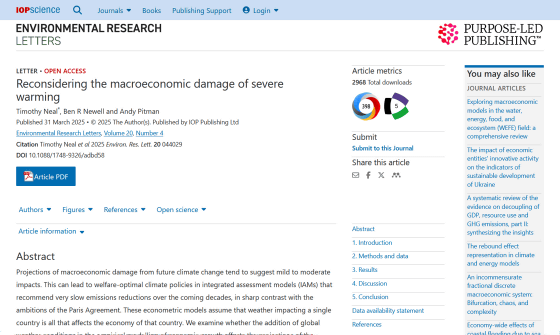Research reveals that if the Earth warms by more than 3 degrees by the end of the 21st century, the average person will be 40% poorer

Until now, various studies have been conducted on the impact of global warming due to climate change on the world economy, but the previous studies had a fundamental error in 'assuming that national economies are only affected by the weather in their own countries.' A new study that models the global impact of climate change has found that if global warming progresses by more than 3 degrees Celsius by 2100, the world's
Reconsidering the macroeconomic damage of severe warming - IOPscience
https://iopscience.iop.org/article/10.1088/1748-9326/adbd58

Global warming of more than 3°C this century may wipe 40% off the world's economy, new analysis reveals
https://theconversation.com/global-warming-of-more-than-3-c-this-century-may-wipe-40-off-the-worlds-economy-new-analysis-reveals-253032
Average person will be 40% poorer if world warms by 4C, new research shows | Climate crisis | The Guardian
https://www.theguardian.com/environment/2025/apr/01/average-person-will-be-40-poorer-if-world-warms-by-4c-new-research-shows
Climate change will affect the economy in many ways. The most obvious are more extreme weather events such as droughts, floods and wildfires that can destroy homes and impact agricultural production. A 2024 study reported that food prices could rise by as much as 3.2% per year due to global warming.
In addition, heat can reduce workers' cognitive function and productivity, and can worsen human health, potentially leading to mass migration and conflict. Many researchers agree that climate change will have a devastating effect on the global economy due to these and other factors.
Many previous studies have predicted that even if an extreme temperature rise of 4 degrees occurs from pre- industrial levels by 2100, the negative impact on the global economy will be only a 7% to 23% decrease in GDP by 2100. The research team points out that this is because many of these modelings are based on 'the effects of past extreme weather.'

Many extreme weather events in the past have been geographically localized and balanced by conditions elsewhere: if there is severe drought in South America, but enough rainfall in other parts of the world, South American countries can import food to maintain their domestic supplies.
However, future climate change is expected to occur simultaneously across countries, increasing the risk of extreme weather events over the long term, disrupting production and distribution networks of goods and limiting countries' ability to help each other in trade.
The team studied the impact of climate change on GDP by estimating how a country's future economic growth would be affected by 'weather conditions in other parts of the world.' They revised three major models and calculated GDP per capita by dividing the estimated global GDP under climate change by the total population.
Previous models estimated that GDP per capita would fall by an average of 11% if the planet warmed by more than 3 degrees by 2100. But the new analysis shows that the same warming could lead to a 40% fall in GDP per capita. This level of damage would have a devastating impact on the livelihoods of many people around the world.
Previous models have suggested that cold regions, such as Russia and northern Europe, would benefit from global warming, but the researchers argue that because the world economy is so interconnected through trade, colder regions will end up suffering as a result of climate change.

Efforts to reduce greenhouse gas emissions may have short-term economic costs that must be balanced against the long-term benefits of avoiding dangerous climate change. A 2023 study suggested that a good balance would be to limit the temperature rise to 2.7 degrees above pre-industrial levels, but the modeling this time showed that the optimal temperature rise is 1.7 degrees. This is consistent with the most ambitious goal of the Paris Agreement .
'Our new research shows that previous predictions about the impact of global warming on the global economy have been far too optimistic,' said lead author Dr Timothy Neal of the Climate Risk Response Institute at the University of New South Wales in Australia. 'The current pace of global greenhouse gas emissions is clearly putting our future and our children's future at risk. The sooner we can understand the disaster that awaits us from severe climate change, the sooner humanity can change course to avoid it.'
Related Posts:
in Science, Posted by log1h_ik







